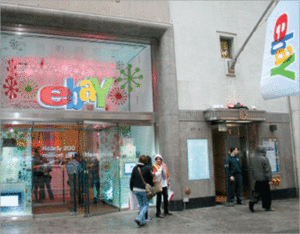
A pop-up eBay store at 3 West 57th StreetDiet Coke, eBay and Fortunoff are not typically brands that have a lot in common. But this year, those companies each occupied the same temporary Manhattan address, 3 West 57th Street, following Bulgari, Coach and other temporary tenants who have set up shop at this site just west of Bergdorf Goodman.
The site’s landlord, the Hakim Organization, which did not return a request for comment, is said to be seeking as much as $5 million in annual rent — a sticker price seemingly too high for a long-term deal.
While pop-up stores began proliferating across the city several years ago as a way for landlords to fill vacant spaces for a few weeks between long-term leases, thanks to the recession they now have a new function. Indeed, some retail spaces, such as 3 West 57th Street and 134 Spring Street, are quietly becoming home to a revolving collection of temporary stores, with no permanent tenants in sight.
In addition, landlords that had not previously been open to temporary deals are inking them.
“Spaces are sitting on the market longer and landlords are more willing to entertain [temporary stores],” said Jeffrey Roseman, executive vice president of Newmark Knight Frank, who represented a landlord in a Ricky’s temporary Halloween store lease at 729 Seventh Avenue and last month inked temporary deals for fragrance brand Aramis at 317 Madison and surf and skate brand Zumiez at 626 Broadway.
The downturn in retail leasing has tenants scoring bargains of 25 to 50 percent on rents for pop-up deals compared to long-term stores. One broker, who asked not to be named, said he recently nabbed his client a temporary location for $85 per square foot — more than 25 percent off the landlord’s initial asking price a few months earlier.
Landlords might be caving on price, but pop-ups benefit their business in other ways. Their short-term nature often creates built-in hype. The buzz potentially brings customers to nearby stores on the same block, helping prop up rents.
In some cases, a pop-up deal initially set for a few days turns into weeks or months, which happened at 134 Spring Street.
The former home of the shoe brand Hogan, which shuttered last spring, 134 Spring played host to designer Lisa Perry’s colorful sixties-inspired dresses over the summer. The women’s fashion theme continued in October with the Limited, which has several stores across Manhattan.
Megawatt stars don’t generally browse the Limited’s low-budget racks, but an ultra-short-term October pop-up showcasing its back-to-the-1980s brand Forenza drew strong traffic and celebrities like Uma Thurman. That prompted the Limited to extend its run there through the end of this month.
The Limited was able to test out the space at a substantial discount to long-term rates. Asking rent for the pop-up store is $65,000 per month, said Karen Bellantoni, executive vice president of Robert K. Futterman & Associates, who represented the landlord in the temporary deals at the Spring Street site.
She said a permanent deal in that space would be a minimum of $150,000 per month.
The revolving door will continue spinning after the Limited exits. First, the Rug Company will take the space for a few months while its home base around the corner at 88 Wooster is renovated. After that, the Limited may return next March — Bellantoni said she’s in discussions with them.
Landlord representatives, not surprisingly, declined to identify clients who are newly amenable to temp deals this year. But brokers contacted by The Real Deal agreed that more owners than ever are warming to the concept.
On Madison Avenue, even the powerful Friedland family, known for uncompromising negotiations and the highest rents on the luxurious retail “Gold Coast,” has caved to the new retail reality as Madison’s average rents plummeted 27 percent this year to $875 per square foot, according to Cushman & Wakefield. The Friedlands have filled the empty storefront at 807 Madison with a clutch of temporary tenants, and William Friedland, vice president of Friedland Properties, recently said he is open to more temporary deals there.
Meanwhile, nearby 900 Madison Avenue (on the corner of 73rd Street), which has been vacant since 2007, may soon become a temporary home to a high-fashion store. Newmark’s Roseman, who has been marketing the space for owner 28 East 73rd Street Corp., declined to name the tenant.
Landlords who are caving in to pop-up mania often do so with hopes of a conversion from temporary to long-term tenant. Beauty retailer Ricky’s, which has opened dozens of temporary Halloween stores for the last few years, sets the model for how a chain can use the newly temp-friendly climate to test-drive locations.
This year, Ricky’s opened 25 Halloween stores on top of its 23 existing year-round beauty and makeup stores. Ricky’s had more sites to choose from than ever, including some of the same temp spaces it leased in 2008. The chain is seeking five to seven long-term leases by the end of 2010 and plans to convert several of the 2009 temporary stores to long-term deals. The company wants to grow — but only at recession-friendly rents.
“This year we did have a choice of locations in demographics we wanted to test,” said Todd Kenig, owner of Ricky’s. “We will sign most likely… in or around those areas, as long as landlords realize it’s still a down economy, and for the next three to five years they need to give some breathing room to us.”